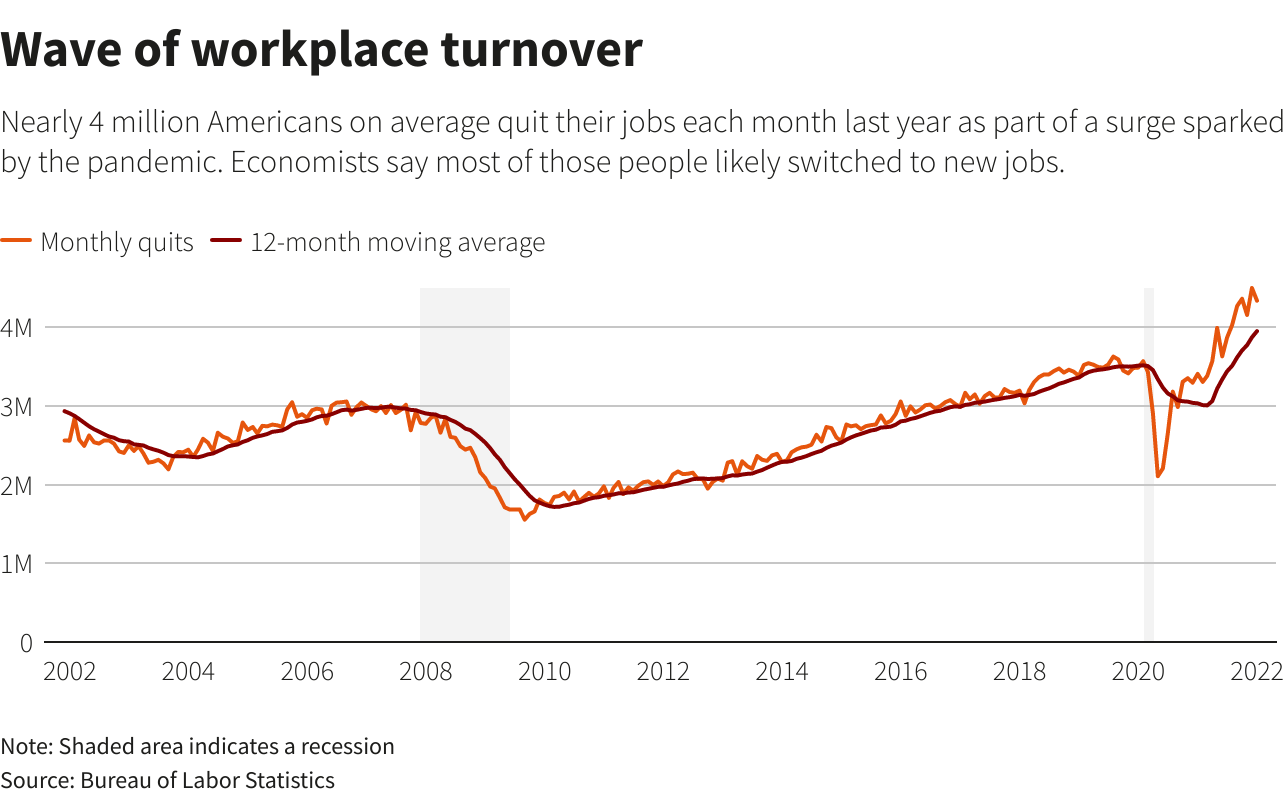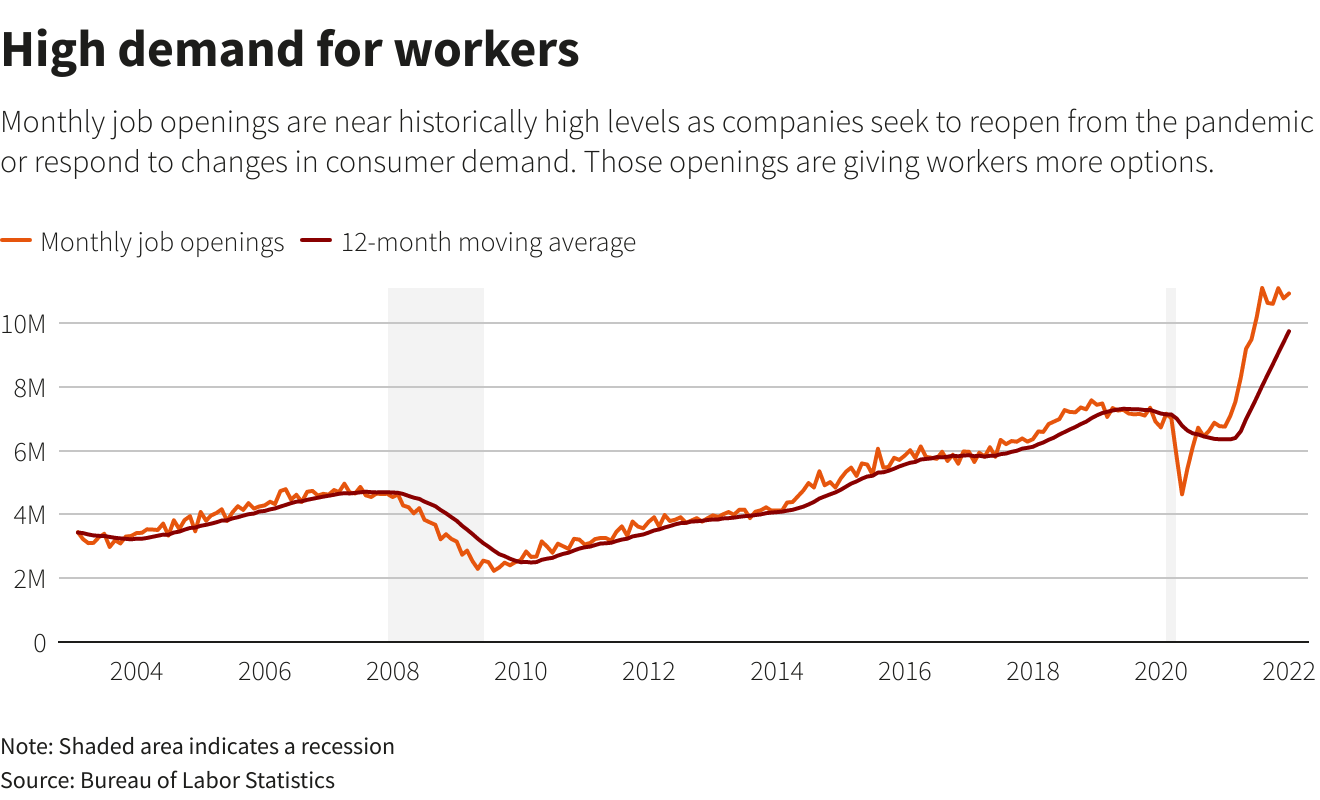Feb 3 (Reuters) – Gina Marino quit two jobs last year.
In the summer, she left a position at a small social media marketing agency for a bigger firm offering more money and greater responsibility.
Three months later, despite liking her colleagues and the company but realizing she lacked passion for the industry she was supporting, she quit again.
Register now for FREE unlimited access to Reuters.com
Register
Marino, 25, wasn’t out of work for long. A more targeted job search brought fast responses from companies needing to fill spots immediately.
“The help was really needed,” said Marino, who lives in Stamford, Connecticut. Last fall, she landed another social media marketing role – this time for a hair care company, which is more in line with her interests.
She’s hardly alone. Nearly 4 million Americans on average quit their jobs each month last year, an unprecedented wave of workplace turnover as the economy emerged from a pandemic-induced recession that, while brief, appears to be leaving a lasting imprint on the U.S. job market.

Job openings are near historically high levels as companies seek to rebuild staff or pivot in response to changes in consumer demand, and there aren’t enough workers to fill all the positions. As of December, there were nearly two openings for every unemployed person, according to the Labor Department.
That mismatch means that many workers are finding themselves with more options – and taking them. With hiring still outpacing the level of quits, some economists say the trend dubbed the “Great Resignation” is really more of a great reshuffling as people take advantage of the tight labor market to move into jobs with better pay, more flexibility or to try something new.
“The job has become a commodity,” said Nela Richardson, chief economist for the payroll processor ADP. “If you don’t like this one, you can get another one.”

HELP FOR FINDING HELP
Companies with open positions need to cast a wider net to reach the right candidate and some are seeking more help.
Business is booming for Goodwin Recruiting, which works regularly with hospitality customers. Allegra Highsmith, vice president of operations, said the firm is now recruiting for roughly 4,700 openings, up from about 1,500 at the start of March 2020, just before the pandemic shuttered the economy.
The firm also doubled its network of independent contractors that help to recruit workers, to more than 200 from about 100 at the end of 2019.
Recruiters are increasingly having frank conversations with employers about how they need to make their offers more appealing by raising pay, improving benefits or adding bonuses and other perks, said Highsmith.
Gianfranco Sorrentino, the owner of three Italian restaurants in Manhattan, Il Gattopardo, Mozzarella & Vino, and The Leopard at des Artistes, is experiencing that firsthand. He bumped up the hourly pay for some kitchen roles, such as porters and dishwashers, to $18 from $15. He also increased the salaries for workers in management by between 15% and 20%.
But Sorrentino, who also owns a catering business, said he is still having a hard time finding skilled managers, servers and bartenders. “We have to be competitive not only with the other restaurants, but with every other kind of industry that is offering the same things,” he said.
HAVING TO STEP AWAY
Not all people who quit are moving to better jobs. Some people are struggling to work because of ongoing disruptions with childcare, and others have had to quit because they don’t have paid sick time or are worried about facing increased health risks on the job, said Elise Gould, a senior economist for the Economic Policy Institute.
“It could be a short-term spell of having to step away,” said Gould.
Nearly 9 million people said they did not work in the first few weeks of January because they were sick with coronavirus or caring for someone who was, according to a Census bureau survey. Economists are dimming their outlooks for job growth in January, with more forecasting that the U.S. economy lost jobs as the Omicron wave hampered demand and led to event cancellations.
How long will the labor shakeup last? It’s possible the churn could slow this year as the reopening phase winds down and more employers either find the workers they’re looking for or learn to manage without them, Richardson said.
Some companies are using technology and automation to get by with smaller staffs or to minimize the risk of disruptions and shutdowns when COVID-19 infections rise, which could lower the demand for workers.
Meanwhile, more people may re-enter the labor market if a subsiding pandemic eases the strains that are keeping them at home, and with more competition for jobs, fewer people might quit, Gould said.
In the meantime, some workers are rethinking what they do and how they spend their time.
Gabby Ianniello didn’t have a job lined up when she quit her job in real estate development in February 2021 seeking a way to spend more time with family and avoid burnout.
She left her Upper West Side Manhattan apartment and moved back in with her parents in Long Island, where she was able to dedicate more time to a podcast and website called the Corporate Quitter, where she shares stories of people like herself who quit their jobs. She earns money from digital product offerings like courses and guides and through consulting, partnerships and affiliate marketing.
Now Ianniello, 28, no longer has to get up at 5 a.m. to squeeze in a run and a shower before getting to the office at 8 a.m. Instead of wearing pencil skirts and heels, she can work in her pajamas. “The great thing is I have autonomy on my schedule so I can kind of pick and choose what I want to do and set the parameters of when I take calls and when I don’t,” she said. “It’s freedom.”
Register now for FREE unlimited access to Reuters.com
Register
Reporting by Jonnelle Marte and Aleksandra Michalska;
Editing by Dan Burns and Andrea Ricci
Our Standards: The Thomson Reuters Trust Principles.
